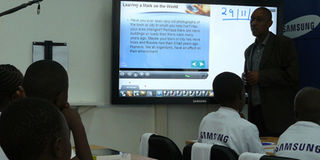Let us adopt e-learning to counter lockdown should Covid-19 escalate

Edward Njoroge, a senior teacher at Lavington Primary School teaches using e-learning. PHOTO|FILE
What you need to know:
- E-learning experts should devise ways of leveraging cell phones to support education.
- How we retrieve, manage and organise information to better inform our lives is a greater challenge than knowledge.
The impact of the deadly coronavirus disease Covid-19 is phenomenal in almost all sectors of the world economy.
Globalisation implies free movement of people, goods and capital to promote and spur economic growth. When this does not happen, the world economy is seriously undermined and even individual countries begin feel the pinch as their economies start to atrophy.
The current situation, where the virus continues to claim lives, is a challenge but also an opportunity for us to seek alternative ways of doing business, including the provision of essential services such as education and health.
SURVIVAL
In his book 5 Minds of the Future, psychologist Howard Gardner observes that the people who will thrive in the future should have or seek to cultivate five competences — to wit creativity, ethical values, respect for others, information synthesising ability and disciplinary competence.
Such minds or people can face current and future threats to survival. Creativity, and its close ally innovation, is what we need now to address such threats. For instance, one of the advices being proffered by medical experts is to avoid crowds —in cinemas, shopping arcades, trains or even schools. That means we should begin looking for other ways to access education and other services.
That advice has been given occasionally by the various embassies in Kenya in regard to avoiding terror attacks.
When push becomes to shove, technology is one way of dealing with the Covid-19 threat. Mobile phones, which are ubiquitous in Kenya, with a penetration of over 70 per cent, could be useful tools for teaching and learning. E-learning experts should devise ways of leveraging cell phones to support education.
INDISPENSABLE ASSETS
For example, some notes or key websites (together with tests and assignments) can be sent to students wherever they may be. Most people use the cellphones primarily for calling and texting but not for learning. Other modes of e-learning, such as Blackboard, can also be enhanced where possible although their prohibitive costs can be a disadvantage.
Other outlets include radio and television. These two have been playing their role of informing, entertaining and educating for a long time but the third role can be enhanced and expanded to cover as many subjects as possible.
Unlike TV sets, radios are found almost in every home in Kenya and they can be indispensable assets in teaching students at home.
Nonetheless, transferring the traditional face-to-face instruction to e-learning needs expert training in order to design, develop and implement content and delivery methods. Uploading notes on a website is not e-learning; the notes need to be adapted to e-learning requirements, including ease of reading, illustrations, aesthetics and sounds.
The good news is that Kenya has experts in this domain and they should be urged to start thinking about the current threat and its possible escalation. The other good news is the presence of mobile phones and radios everywhere.
CREATIVE HATS
Lastly, as wear our creative hats, we need to develop our capacity for synthesising information. The big challenge is no longer that students cannot access information — nay, it’s their ability to sieve the deluge of information in order to make sense of their world.
How we retrieve, manage and organise information to better inform our lives is a greater challenge than knowledge. How we learn is more important than the knowledge. The process is more crucial than the product.
In this regard, we should be teaching our students how to synthesise information, and how to learn about learning, or meta-learning. Without this competence, students will not know what to do with the vast amount of knowledge bombarding them from the internet, radio and television.
To embrace e-learning, or distance learning, more effectively on a large scale will require significant budget allocations by the national government — as preparedness in case the virus threat escalates.
Prof Iraki teaches French at USIU-Africa. [email protected].





